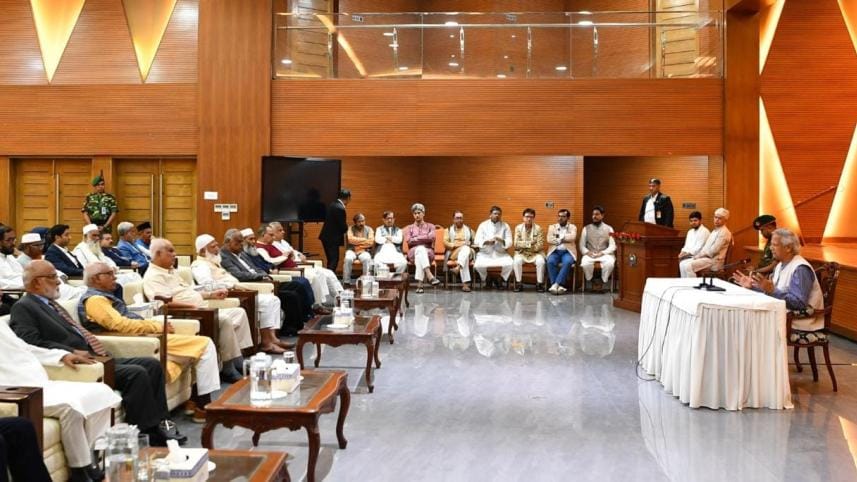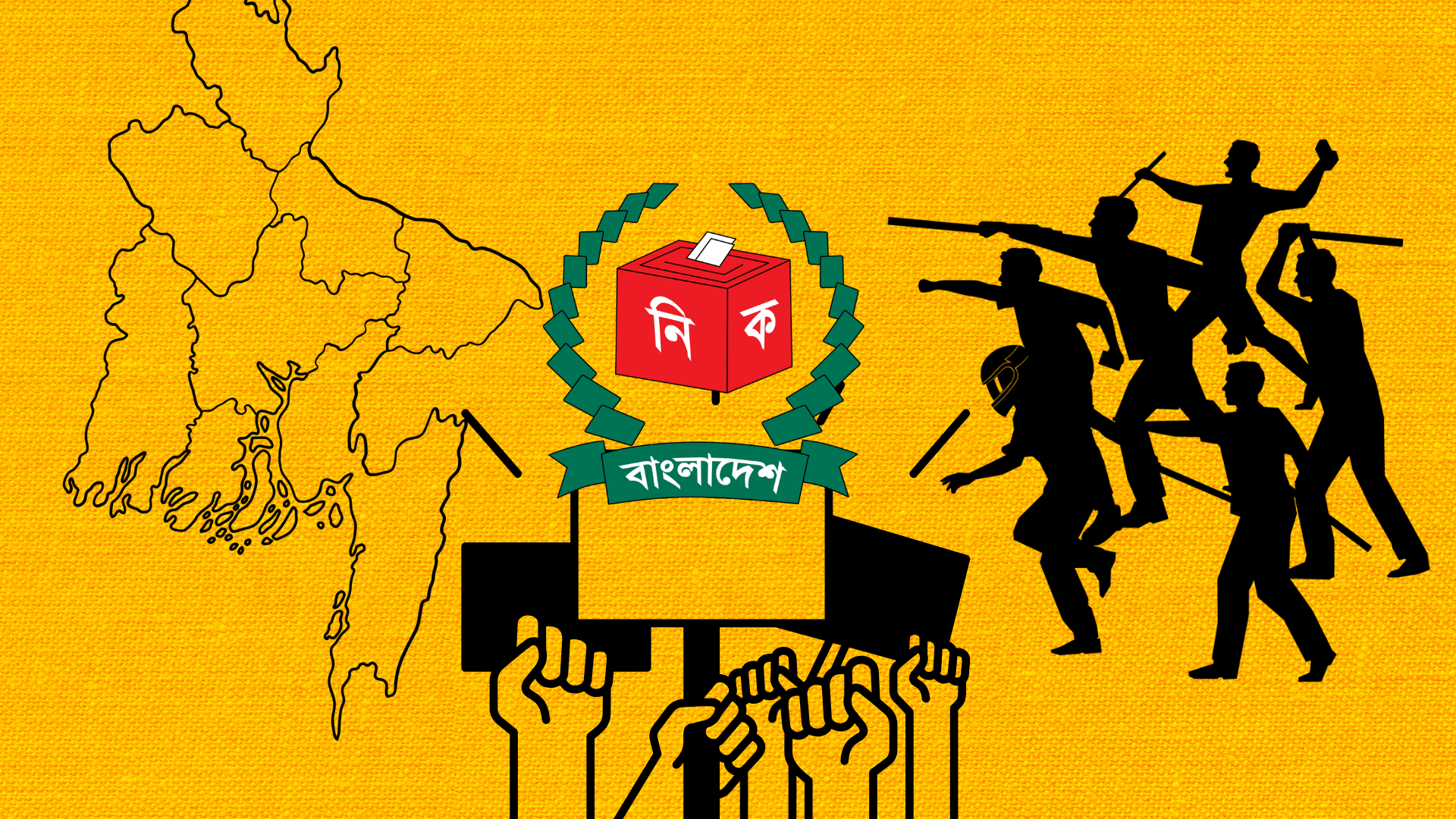National unity alone can ensure stability and desired reforms

In August 2024, the chief adviser of the interim government said in his speech, "We are one family. We have one goal. We are committed to fulfilling the aspirations of our youth, and we are ready to take on this challenge." This statement reflected his concern that if national unity collapsed, the achievements of the mass uprising could be lost. That very concern is now becoming evident.
Since taking over the country's governance, the interim government has faced disruptions to public life from more than 170 movements driven by diverse vested interests. This wave of demonstrations arises from the perceived weakness of the interim administration, marked by fractured state institutions and the absence of a political party's organisational strength. Protesters have exploited this vulnerability to push their demands—some legitimate, others serving personal agendas—at a time when maintaining national unity is more critical than ever. Since independence, political parties have weaponised divisive ideologies such as the "spirit of independence," "Bengali vs Bangladeshi," and "Pro-India vs Pro-Pakistan." Although these differences are minimal in reality, they have been exaggerated to serve political agendas. This deliberate polarisation has kept Bangladesh trapped in a cycle of disunity and stagnation. Oxford development economist Paul Collier refers to such situations as a "Conflict Trap," where persistent division severely restricts a society's potential for progress. To break free from this cycle, the country's politics must prioritise public welfare over divisive narratives.
The previous government left the country's economy and governance system in a fragile state. Due to the inefficiency of state institutions and the perceived weakness of the government, the law-and-order situation has deteriorated, commodity prices have soared, and extortion has become rampant. Continuous street protests threaten to paralyse public order, further worsening an already fragile situation.
When the interim government was formed, many hoped it would steer the country towards stability. However, six months down the line, that optimism has faded. Even the chief adviser recently acknowledged growing concerns over the government's ability to manage the crisis.
Political theorists have long argued that while governments enforce laws, citizens must uphold them, and political parties should act as a bridge between the state and the people. The current crisis has revealed weaknesses in all three areas.
The interim government has taken on the responsibility of managing a weakened state, where law enforcement, the judiciary, and public administration were dismantled by previous rulers. These institutions require extensive reforms, which cannot be achieved in the short term. Given this, the government must engage in open dialogue with political parties, civil society, and key stakeholders to present a clear roadmap for necessary reforms and announce a specific date for national elections. It appears the government is moving in that direction.
The country faces severe law and order challenges due to the lack of an impartial and effective police force. Currently, the police-to-population ratio in Bangladesh is significantly inadequate. To meet effective policing standards, Bangladesh needs to recruit a substantial number of additional police personnel. However, since such an expansion cannot happen overnight, deploying other disciplined forces is necessary to manage the country's current crisis.
Military forces with expanded authority have been deployed, but their numbers remain limited for policing duties due to their primary defense responsibilities. Paramilitary groups such as the Ansars, the Village Defence Party (VDP), and the Bangladesh National Cadet Corps (BNCC), along with retired military and law enforcement personnel, can play a vital role in maintaining public order. The VDP alone consists of thousands of trained individuals with strong grassroots connections, making it particularly well-suited to managing law and order in upazilas and rural areas.
Finally, the performance of the advisers within the interim government must be critically assessed. Formed hastily amid a national crisis, the government, now after six months in power, must identify and replace underperforming advisers with competent, results-driven individuals.
Political parties must move beyond verbal support and actively assist the government. While insisting on a definitive election date is logical, political parties must play an active role in resolving several critical national issues—improving law and order being one of them.
During Durga Puja, political parties played a commendable role in protecting Hindu temples. A similar model could be adopted to combat extortion, highway robbery, and the activities of teenage gangs through community policing initiatives. This would have the added benefit of increasing public support for the parties, which would help them in the next election.
Recent protests by students, bureaucrats, and labour unions have prioritised narrow interests over national stability, disrupting public life. Political parties, leveraging their networks within these groups, should mediate these grievances through constructive dialogue, ensuring short-term demands do not aggravate the current crisis.
A political party that claims broad public support must demonstrate it by actively engaging with all segments of society to improve current conditions. Failing to do so weakens its credibility and casts doubt on its ability to lead a future government. With public scrutiny at its peak, the party's actions today will significantly shape voter sentiment in upcoming elections.
Leaders of the anti-discrimination student movement played a crucial role in recent political events and must now set a clear, purposeful direction. Forming a party with government support would merely repeat past mistakes. Instead, they should prioritise a long-term vision focused on addressing the root causes of underdevelopment. The most effective reform lies in fostering a politically aware and engaged citizenry—transforming individuals into active citizens. Although this is a lengthy process, it remains the only sustainable solution.
Thus, the primary aim of a new political party formed by students should be to spearhead systemic reforms by confronting colonial-era structures that hinder effective governance. Their most significant role would be to educate grassroots communities, fostering socio-political awareness and mobilising citizens to stand against injustice, corruption, and deep-rooted misgovernance. By choosing to remain in opposition rather than pursuing power, they can serve as an effective watchdog—ensuring government accountability without becoming entangled in it. Bangladesh is at a critical juncture. The August 5 movement has highlighted the urgent need for structural reform, but achieving this will require the active participation of all stakeholders. Playing the blame game will not resolve the crisis. The country's future depends on shared responsibility, strategic reforms, and a commitment to unity. If the interim government fails, it will not be their failure alone—it will be a collective failure of the political class, civil society, and the people. Only a unified, pragmatic approach can enable Bangladesh to break free from the cycle of conflict and division. The time to act is now.
Saifur Rahman is a senior IT specialist and certified professional.
Views expressed in this article are the author's own.
Follow The Daily Star Opinion on Facebook for the latest opinions, commentaries, and analyses by experts and professionals. To contribute your article or letter to The Daily Star Opinion, see our guidelines for submission.




 For all latest news, follow The Daily Star's Google News channel.
For all latest news, follow The Daily Star's Google News channel. 
Comments